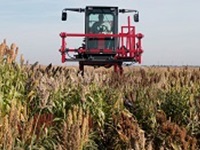Automated Sorghum Phenotyping and Trait Development Platform

Technology Description:
Purdue University, along with IBM Research and international partners from the Commonwealth Scientific and Industrial Research Organisation (CSIRO, Australia) will utilize remote sensing platforms to collect data and develop models for automated phenotyping and predictive plant growth. The team will create a system that combines data streams from ground and airborne mobile platforms for high-throughput automated field phenotyping. The team's custom "phenomobile" will be a mobile, ground-based platform that will carry a sensor package capable of measuring numerous plant traits in a large number of research plots in a single day. In addition, the team will use unmanned aerial vehicles (UAVs) equipped with advanced sensors configured to optimize the collection of diverse phenotypic data and complement the data collected from the phenomobile. Advanced image and signal processing methods will be utilized to extract phenotypic information and develop predictive models for plant growth and development. IBM Research will contribute high-performance computing platforms and advanced machine learning approaches to associate these measurements with genomic information to identify genes controlling sorghum performance. International partners from CSIRO will lend their expertise in crop modelling and phenotyping to the effort.
Potential Impact:
If successful, the Purdue team will create a phenotyping system that optimizes high-throughput sensing technologies for acquiring relevant data on sorghum phenotypes. Combined with their data analytics efforts, this work may drive future sorghum genetic improvement, resulting in improved energy-sorghum varieties.
Security:
Improved biofuel crops could lead to increased production of domestic biofuels, reducing dependence on foreign sources of transportation fuels.
Environment:
Increased use of biofuels could significantly reduce CO2 emissions from transportation, and improved varieties of biofuel crops could use less water and be more resistant to environmental stress.
Economy:
Advanced crop breeding techniques could improve and lower the cost of developing high yielding and high quality crop hybrids for biofuels and other agricultural applications
Contact
ARPA-E Program Director:
Dr. Rachel Slaybaugh
Project Contact:
Prof. Mitchell Tuinstra
Press and General Inquiries Email:
ARPA-E-Comms@hq.doe.gov
Project Contact Email:
mtuinstr@purdue.edu
Partners
IBM T. J. Watson Research Center
Related Projects
Release Date:
10/01/2014
